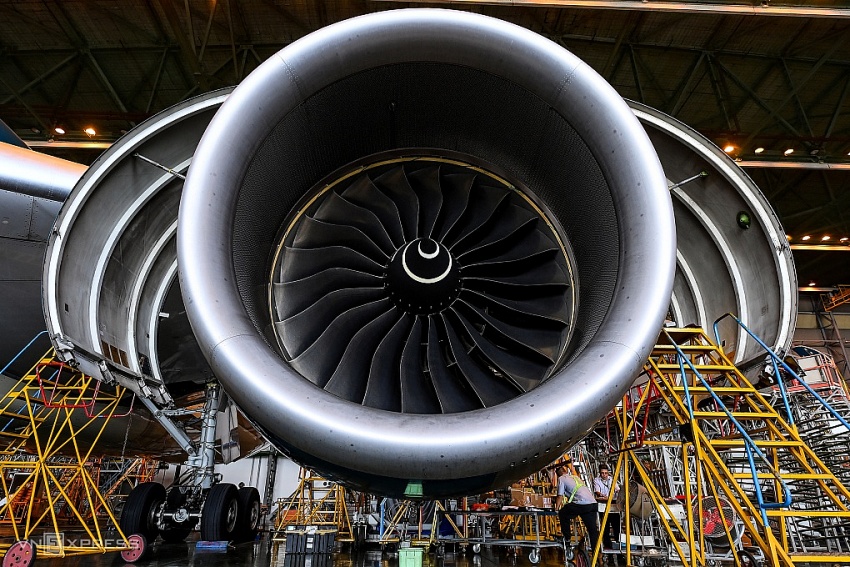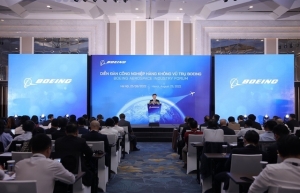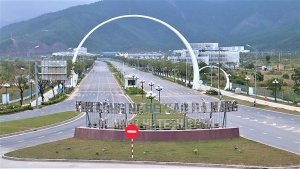Vietnam advised to develop aviation supporting industries
At the Vietnam Aviation Investment Programme held in Ho Chi Minh City on August 15, the disparity in the country's aviation sector was attributed to the lack of core technology within the industry, according to experts.
 |
The aviation supporting industry, which includes the research, design, manufacturing, maintenance, and repair of aircraft and ground aviation equipment, has the potential to create numerous jobs and help balance the current uneven development in the sector.
According to an executive from a domestic airline, the underdevelopment of Vietnam's aviation support industry is primarily due to a lack of incentive mechanisms, leading to a heavy reliance on foreign technology.
He stated, "Vietnam needs to study and implement mechanisms that encourage businesses to participate in the development of the aviation support industry. This would help reduce the industry's dependence on imported technology."
"Vietnam is currently subcontracting, as we have to import everything from aircraft and engines to components like brakes and tyres. This complete dependence on external sources drives up costs for airlines. In fact, leasing aircraft and engine maintenance account for nearly half of the cost structure for domestic airlines. We are unable to intervene in these costs and must accept global price standards," he added.
Apart from Vietnam Airlines Engineering Company, currently only one private company, Aircraft Engineering Services Company, is involved in aircraft maintenance and repair.
Ground aviation support industries are also limited, with only a few products from ATTECH, an air traffic management company, serving air traffic management and navigation electronics.
To build a strong aviation support industry, human resources cannot be overlooked, making workforce training, especially for engineers, a critical factor in the sector's development.
Tran Thi Thai Binh, head of the Air Transport Economics Department of the Vietnam Aviation Academy, said, "There is a significant gap between the demand for and the ability to supply internationally qualified aviation engineers in Vietnam, leading to a reliance on foreign personnel for key technical and managerial positions."
Binh recommended that airlines increase collaboration by bringing in foreign experts to teach and apply international practices. This would allow future local experts to access advanced techniques and technologies.
"The demand for high-quality human resources presents both a challenge and an opportunity to ensure Vietnam maintains a key role in global aviation. However, to seize this opportunity, we must act now," Binh emphasised.
According to statistics from the Civil Aviation Authority of Vietnam, as of March 15, Vietnam had 222 registered aircraft, including 203 commercial planes operated by domestic airlines. However, this number does not fully reflect the fleet's size, as airlines can lease aircraft on a short-term basis when necessary. Additionally, several airlines have placed orders for more planes. In February, VietjetAir and Airbus signed a contract for over 100 aircraft, with the first deliveries expected this year.
Vietnam currently has 22 airports, serving 100 million passengers annually. According to the master plan, the number of airports will increase to 30 by 2030 and 33 by 2050. Over the next decade, passenger numbers are projected to reach nearly 300 million.
 | New planes and routes as aviation picks up With a promising outlook in the post-pandemic era, international aircraft manufacturers are seeking to expand their partnerships in Vietnam’s burgeoning aviation market to tap into its growing demand for aircraft and related tech, as well as to expand their supply chain. |
 | Reforming the aviation sector The proximity of connecting airports is not a decisive determinant of the performance of an operation, and private-public partnership (PPP) in the reshaping of national aviation infrastructure should be encouraging, a workshop has heard. |
 | KP Aero Industries to build $20 million aerospace component factory in Danang South Korea's KP Aero Industries Co., Ltd. will pour $20 million into an aerospace component assembly facility for Boeing in Danang. |
What the stars mean:
★ Poor ★ ★ Promising ★★★ Good ★★★★ Very good ★★★★★ Exceptional
Related Contents
Latest News
More News
- SK Innovation-led consortium wins $2.3 billion LNG project in Nghe An (February 25, 2026 | 07:56)
- THACO opens $70 million manufacturing complex in Danang (February 25, 2026 | 07:54)
- Phu Quoc International Airport expansion approved to meet rising demand (February 24, 2026 | 10:00)
- Bac Giang International Logistics Centre faces land clearance barrier (February 24, 2026 | 08:00)
- Bright prospects abound in European investment (February 19, 2026 | 20:27)
- Internal strengths attest to commitment to progress (February 19, 2026 | 20:13)
- Vietnam, New Zealand seek level-up in ties (February 19, 2026 | 18:06)
- Untapped potential in relations with Indonesia (February 19, 2026 | 17:56)
- German strengths match Vietnamese aspirations (February 19, 2026 | 17:40)
- Kim Long Motor and AOJ Suzhou enter strategic partnership (February 16, 2026 | 13:27)

 Tag:
Tag:




















 Mobile Version
Mobile Version